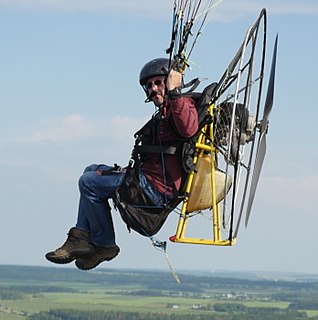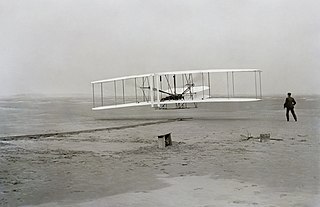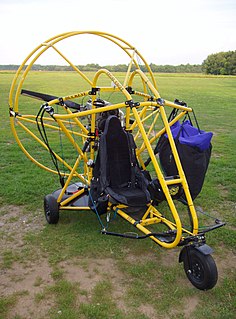
The ISON Airbike and Tandem Airbike are a family of American high-wing, tractor configuration ultralight aircraft, that were available in kit form. The single-seat Airbike was introduced in 1994 and the two-seat Tandem Airbike was unveiled in 1996.
The Zenoah G-25 is a single cylinder, two stroke, carburetted aircraft engine, with optional fuel injection, designed for use on ultralight aircraft
The Cosmos Samba, named after the dance of the same name, is a French flying wing ultralight trike that is produced by Cosmos ULM of Fontaine-lès-Dijon, France. The aircraft is supplied as a complete aircraft and is not available as a kit.
The LiteWing Aircraft LiteTrike, also called The Lite Trike, is an American ultralight trike that was designed and produced by LiteWing Aircraft of Caryville, Tennessee in the late 1990s. The aircraft was supplied fully assembled.
The Mainair Rapier is a British flying wing ultralight trike that was designed and produced by Mainair Sports and later P&M Aviation. The aircraft was supplied as a completed aircraft or as a kit for amateur construction, followed by a factory inspection prior to flight.
The Paladin Golden Eagle is an American powered parachute, that was designed and produced by Paladin Industries of Pennsauken, New Jersey.
The Tennessee Propellers Scout is an American powered parachute that was designed and produced by Tennessee Propellers of Normandy, Tennessee. The aircraft was introduced in 1999, but is no longer available.
The Adventure F series is a family of French paramotor designs that was designed and produced by Adventure SA of Méré, Yonne, for powered paragliding.
The Daiichi Kosho Whisper is a Japanese paramotor that was designed and produced by the Daiichi Kosho Company for powered paragliding.
The Paraborne Backplane is an American paramotor that was designed by Scott Alan and produced by Paraborne Aviation of Kissimmee, Florida for powered paragliding.
The Phoenix Industries B1Z ParaFlyer is an American paramotor that was designed and produced by Phoenix Industries of Southampton, New Jersey for powered paragliding.
The Paramotor Inc FX series is a family of American paramotors that was designed and produced by Paramotor Inc of Weldon Spring, Missouri for powered paragliding.
The Southern Skies Spymotor is an American paramotor that was designed and produced by Southern Skies of Taylorsville, North Carolina for powered paragliding.
The Summit 103 Mini Breeze is an American powered parachute, designed and produced by Summit Aerosports of Yale, Michigan.
The Phoenix Industries CV1 ParaFlyer is an American powered parachute that was designed and produced by Phoenix Industries of Southampton, New Jersey. Now out of production, when it was available the aircraft was supplied as a complete ready-to-fly-aircraft.
The Phoenix Industries Sport is an American powered parachute that was designed and produced by Phoenix Industries of Southampton, New Jersey. Now out of production, when it was available the aircraft was supplied as in the form of plans for amateur construction. In addition to the plans the company also supplied materials kits and canopies.
The Personal Flight Sky-Bike is an American paramotor that was designed and produced by Personal Flight of Kent, Washington for powered paragliding. Now out of production, when it was available the aircraft was supplied as a kit for amateur construction.
The Personal Flight Sky-Bike Trike is an American powered parachute that was designed and produced by Personal Flight of Kent, Washington. Now out of production, when it was available the aircraft was supplied as a kit for amateur construction.
The La Mouette SR 210 is a French paramotor that was designed and produced by La Mouette of Fontaine-lès-Dijon for powered paragliding. Now out of production, when it was available the aircraft was supplied complete and ready-to-fly.
The La Mouette ZR 250 is a French paramotor that was designed and produced by La Mouette of Fontaine-lès-Dijon for powered paragliding. Now out of production, when it was available the aircraft was supplied complete and ready-to-fly.







